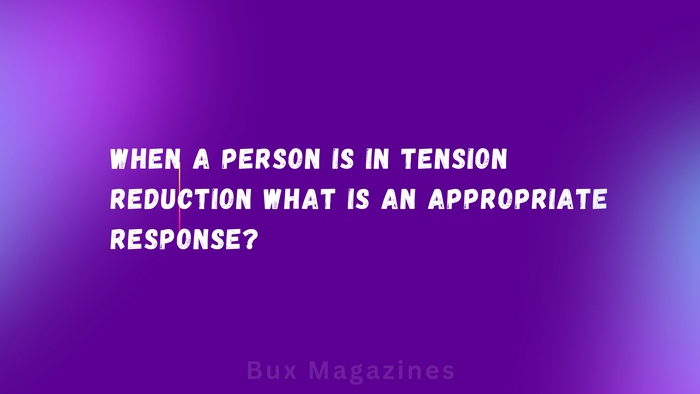In the modern world, where everything happens so quickly, it is necessary to learn how to control stress and anxiety in order to maintain mental and emotional health. When a person is in tension reduction what is an appropriate response? They actively seek solutions to release stress and achieve equilibrium in their lives. This article aims to provide practical recommendations for offering assistance to an individual undergoing tension reduction and investigate the proper reactions that should be given to such an individual.
What is Tension Reduction?
Through tension reduction, individuals endeavor to attain mental equilibrium and stress relief. This process can be facilitated by various methods, including deep breathing, meditation, exercise, or simply pausing an activity that is causing distress. Our objective is to mitigate the detrimental consequences of stress on our bodies and minds, which may manifest as physical discomfort, anxiety, or wrath.
When an individual is engaged in tension reduction, they are likely at their most vulnerable, striving to regain control and experience emotional well-being. It is crucial to comprehend the circumstances in order to offer the appropriate assistance.

Key Principles of Responding to Tension Reduction
Stay Calm and Composed
In the process of striving to reduce their anxiety, the degree of equanimity that an individual possesses regarding themselves can have a significant impact on the extent to which they can relax and unwind. When one demonstrates composure, they are able to encourage the efforts of others to cool down and contribute to the creation of an environment that is welcoming and serene. To reduce the amount of conflict that occurs in your interactions with other people, you should cultivate patience and self-control.
Active Listening
One of the most successful techniques available today for helping someone through tension reduction is active listening. To achieve this, you have to give the person your whole undivided attention free from interruptions. Children should be free to communicate their opinions and emotions without regard to judgment. Actively listening to the other person will help you to show that you care about their well-being and validate their experience.
Verify Assurance
For someone experiencing a decline in their level of tension, certainty can be really soothing. Tell them it’s normal to feel stressed and that their feelings are true. Simple affirmations like “It is acceptable to experience this emotion” or “Things will improve,” can help greatly emotionally release you and provide a feeling of security.
Exercise tolerance.
Everybody has a different experience with lowering stress, and each individual may need different time for it. Keeping some calmness and avoiding hurrying through the process is absolutely vital. Let them work through their emotions at their own speed. Apart from their ineffectiveness, pressure on them to “snap out of it” or proceed could raise their stress level.
Please provide comfort and assistance.
Depending on the situation, either verbal or physical communication could help someone find comfort. This might be a very pleasant hug, a gentle phrase, or a quite natural touch. Please kindly inform them you are free to help them and that others are striving for their objectives.
Offer Recommendations on Relaxation Techniques
If it is appropriate and if they are open to the proposal, a little advice of relaxation practices that could help in lowering their tension should be provided. By means of effective techniques, including deep breathing exercises, progressive muscular relaxation, and mindfulness, one can help someone to regain peace. It is imperative to make sure these choices are seen as possible tools instead of actions one has to do.
Respect their borders
It is important to honor the personal limits that people have set for themselves while they are striving to lower stress. Think about their inclination for privacy or solitude. Though you should avoid being invasive or imposing on them, you should let them know you can assist them in any form they need. You are proving that you respect their limits and that you understand them, thereby fostering the building of confidence.

Practical Examples of Responses
Scenario: Nervous Colleague
Consider a coworker who appears anxious upon receiving feedback on a project. They may exhibit pace, rapid speech, or indications of discomfort. Under these circumstances, you should approach them in a composed manner and inquire if they are open to a conversation or if there is any assistance you can provide. Engaging in active listening enables you to acknowledge and affirm their emotions. Emphasizing their capabilities and previous achievements will provide reassurance.
Situation: Friend’s Upsetness
Imagine a friend in mourning over a personal loss. People may pull away from social events or cry. Under these circumstances, you might say, “I am quite sorry for your difficulties.” I’ll help you. If they are honest, recommend a former hobby or breakthrough. Honor their need for alone time, but be ready for a conversation when they want it.
Situation: Stressful Family Member
Imagine a family member stressing over a demanding day. They might show impatience or a short fuse. In this situation, you could offer to handle any chores or responsibilities exacerbating their stress. Participate in a calm activity with someone, such as walking or seeing a show you enjoy. Establish a nonjudging environment where they could voice concerns and annoyances.

Conclusion
Finally, your method should reflect others’ emotions and respect. Make the person feel supported, appreciated, and heard. This enhances their health and stress management. When a person is in tension reduction what is an appropriate response? Being nice, patient, and supportive to someone who needs to relax is crucial. If you keep cool, listen, reassure, and respect their bounds, you may easily create a stress-reduction environment. To effectively help someone achieve emotional balance, you must understand their wants and requirements.
ALSO READ: What is the point where your greatest talents passions and values intersect?






